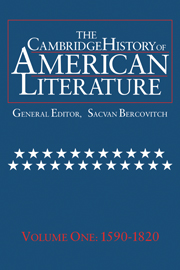Book contents
- Frontmatter
- Introduction
- THE LITERATURE OF COLONIZATION
- NEW ENGLAND PURITAN LITERATURE
- 1 The Language of Salem Witchcraft
- 2 The Dream of a Christian Utopia
- 3 Personal Narrative and History
- 4 Poetry
- 5 The Jeremiad
- 6 Reason and Revivalism
- BRITISH-AMERICAN BELLES LETTRES
- THE AMERICAN ENLIGHTENMENT, 1750–1820
- THE LITERATURE OF THE REVOLUTIONARY AND EARLY NATIONAL PERIODS
- Chronology
- Bibliography
- Index
6 - Reason and Revivalism
from NEW ENGLAND PURITAN LITERATURE
Published online by Cambridge University Press: 28 March 2008
- Frontmatter
- Introduction
- THE LITERATURE OF COLONIZATION
- NEW ENGLAND PURITAN LITERATURE
- 1 The Language of Salem Witchcraft
- 2 The Dream of a Christian Utopia
- 3 Personal Narrative and History
- 4 Poetry
- 5 The Jeremiad
- 6 Reason and Revivalism
- BRITISH-AMERICAN BELLES LETTRES
- THE AMERICAN ENLIGHTENMENT, 1750–1820
- THE LITERATURE OF THE REVOLUTIONARY AND EARLY NATIONAL PERIODS
- Chronology
- Bibliography
- Index
Summary
Beginning in the 1650s, the growing number of merchants in Boston, Salem, Cambridge, New-town, and other large towns along the seaboard began to discover themselves to be a special class. Unlike farmers, who were threatened by new immigrants seeking land, the merchants favored the growth and development of new products and international trade. During the Half-Way Covenant controversy of the 1660s, powerful merchants such as John Hull embraced those Pauline aspects of Puritan doctrines that had originally favored expansion of the fellowship, and they sided with those who supported more liberal membership standards. As disputes raged within First Church, Boston, in the 1660s, a coalition made up mainly of merchants split off to found Third Church, later known as the Old South. Under the leadership of Thomas Thatcher until 1678 and of Samuel Willard from then until his death in 1707, the Old South maintained quite lenient membership requirements.
One critical text confronting the issue of church membership was Giles Firmin's The Real Christian (1670). A prolific contributor to the parliamentary debates under Cromwell, Firmin lived in New England in the 1630s and 1640s and then returned to England during the Protectorate. Firmin had criticized his former New England colleagues Thomas Hooker and Thomas Shepard for being too rigid in their schematic accounts of preparation and for their discouragingly high standards for proving conversion. Firmin tried to persuade his English colleagues to advocate more tolerance, to understand “self-love” as natural, and to recognize God to be merciful and reasonable. His work found wide circulation in Boston in the 1670s, and its republication in Boston in 1742 demonstrates that the debates over conversion and church membership still continued seventy years later.
- Type
- Chapter
- Information
- The Cambridge History of American Literature , pp. 279 - 306Publisher: Cambridge University PressPrint publication year: 1994

